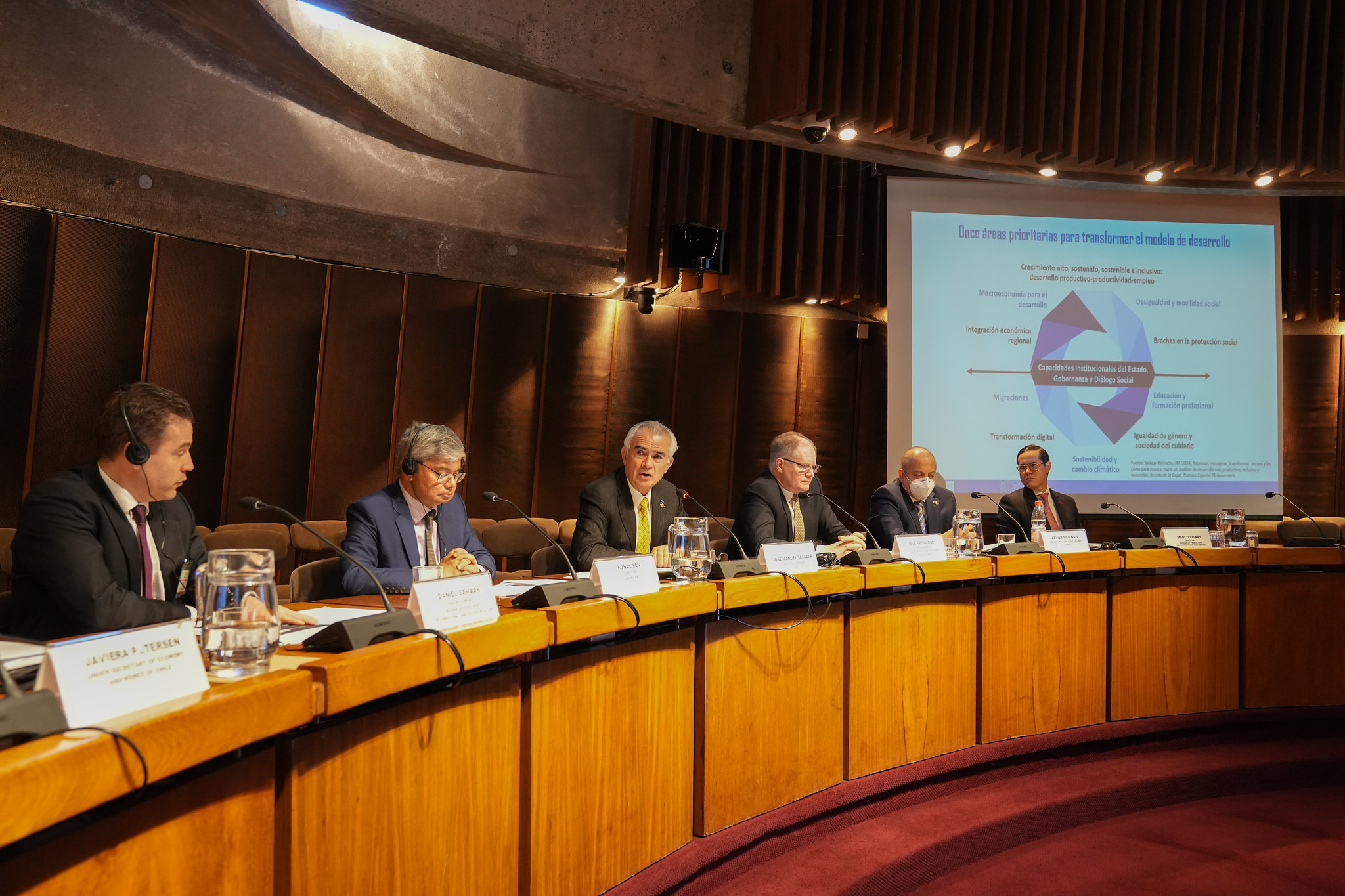Authorities and Specialists Analyzed the State of Productive Development Policies and Their Impact on the Region’s Productivity and Growth
Work area(s)
The high-level seminar featured initial presentations by José Manuel Salazar-Xirinachs, Executive Secretary of ECLAC, and Kunal Sen, Director of UNU-WIDER.

Authorities, representatives of international organizations and academics analyzed this Wednesday, March 13, 2024 the state of productive development policies (PDPs) and their prospects, along with their impact on productivity, economic growth and the structural transformations that the region requires, at a seminar in Santiago, Chile organized by the Economic Commission for Latin America and the Caribbean (ECLAC) and UNU-WIDER.
The event, entitled Connecting the Productivity Challenge with Productive Development Policies in Latin America and the Caribbean, featured opening remarks by José Manuel Salazar-Xirinachs, Executive Secretary of ECLAC, and Kunal Sen, Director of UNU-WIDER.
“We strongly believe, and we strongly recommend to countries, that in order to achieve a more productive, inclusive and sustainable development pattern, the escalation of productive development policies is urgently needed. This goes to the heart of the development models in the region, and is essential for their transformation,” José Manuel Salazar-Xirinachs emphasized.
“In productive development policies lies the toolbox for orienting growth in certain directions and towards higher and more sustained rates, which means guiding processes of economic transformation towards more inclusive and sustainable development patterns,” explained ECLAC’s highest authority, who gave a presentation entitled “The challenge of escalating and improving productive development policies in Latin America and the Caribbean.”
Latin America and the Caribbean, José Manuel Salazar-Xirinachs indicated, is experiencing a development crisis that is manifested in three main traps or syndromes: a low-growth trap, a trap of high inequality, and a trap of low institutional and governance capacities.
In 1960, he said, the GDP per capita of Latin America and the Caribbean was US$ 3,295 (in constant 2015 dollars), three times that of countries such as the Republic of Korea, Taiwan, China and Vietnam. However, by 1990, it had only risen to US$ 6,000 and today, 30 years later, it has only reached US$ 8,500, which is equivalent to a growth rate of just 1.2% per year. Furthermore, from 2014 to date, the region’s GDP per capita contracted by 0.1%, reflecting a decade of impoverishment.
In this context, ECLAC is proposing ten priority areas to transform the region’s development model, along with a portfolio of driving or dynamic sectors, which are understood as areas of opportunity for growth and collaboration.
These dynamic sectors include the energy transition, electromobility, the circular economy, sustainable tourism, the pharmaceutical and life-sciences industry, the medical devices industry, the exportation of modern services or services enabled by Information and Communication Technologies (ICTs), and the care society, to name a few.
José Manuel Salazar-Xirinachs also shared six guidelines for productive development policies: 1) Intensify and improve PDPs using a new generation perspective; 2) Define productive priorities; 3) Balance a centralized approach with a territorial approach; 4) Use cluster and territorial productive articulation initiatives as an effective way to organize management and collaboration processes for productive development; 5) Improve PDP governance in line with the experimentalist governance approach; 6) Evaluate.
“Latin America and the Caribbean has seen increasing de-industrialization. However, the region has done relatively well in the sector of tradable business services,” Kunal Sen, Director of UNU-WIDER, noted during his presentation entitled “Productivity and Varieties of Structural Change in Latin America.”
“Within the continent, we see huge variations in structural transformation,” Kunal Sen indicated. This is also true in the area of productivity since, he said, there is a group of countries with good results (Chile, Colombia, Costa Rica) and another with weaker results, which includes Brazil, Ecuador and Peru.
“Except for Costa Rica and Mexico (where manufacturing is still important), tradable modern services may well be the route to productive structural transformation, if productivity in this sector can be improved,” the Director of UNU-WIDER affirmed.
Speaking on the event’s two panels were Javiera Petersen, Under-secretary of Economy and MSMEs of Chile; William Maloney, Chief Economist for Latin America and Caribbean at the World Bank; Daniel Samaan, Senior Economist in the Research Department of the International Labour Organization (ILO); Andrés Solimano, President of CIGLOB; Juan Carlos Hallak, Professor at the University of Buenos Aires; Tomasso Ciarli, Researcher at UNU-MERIT; Chiara Criscuolo, Head of the Productivity, Innovation and Entrepreneurship (PIE) Division at the OECD; Marco Llinás, Director of ECLAC’s Division of Production, Productivity and Management; and Felipe Correa, a Researcher in the same Division.
Related content
Type
Country(ies)
- Latin America and the Caribbean
Related link(s)
Contact
Public Information Unit
- prensa@cepal.org
- (56 2) 2210 2040